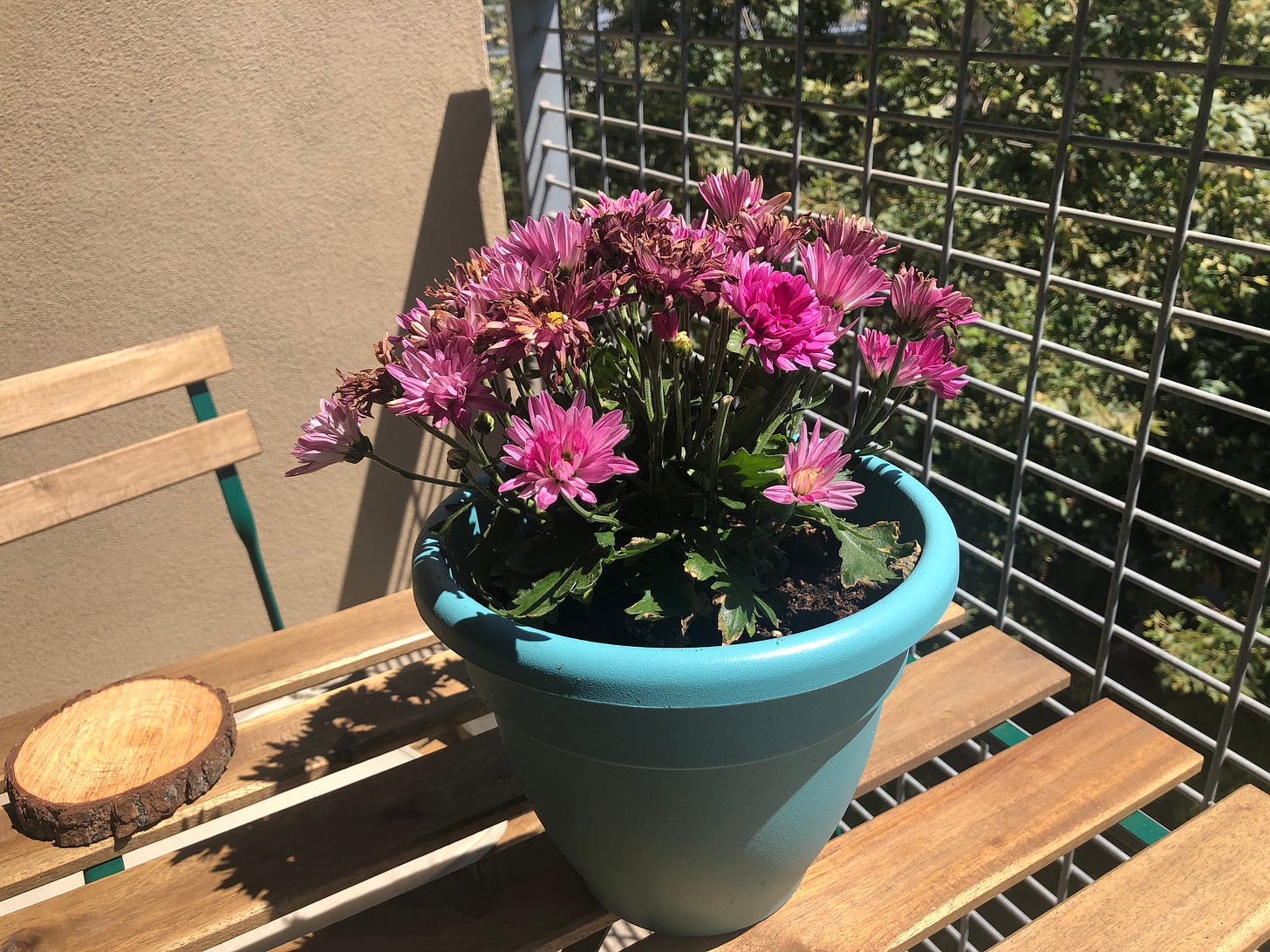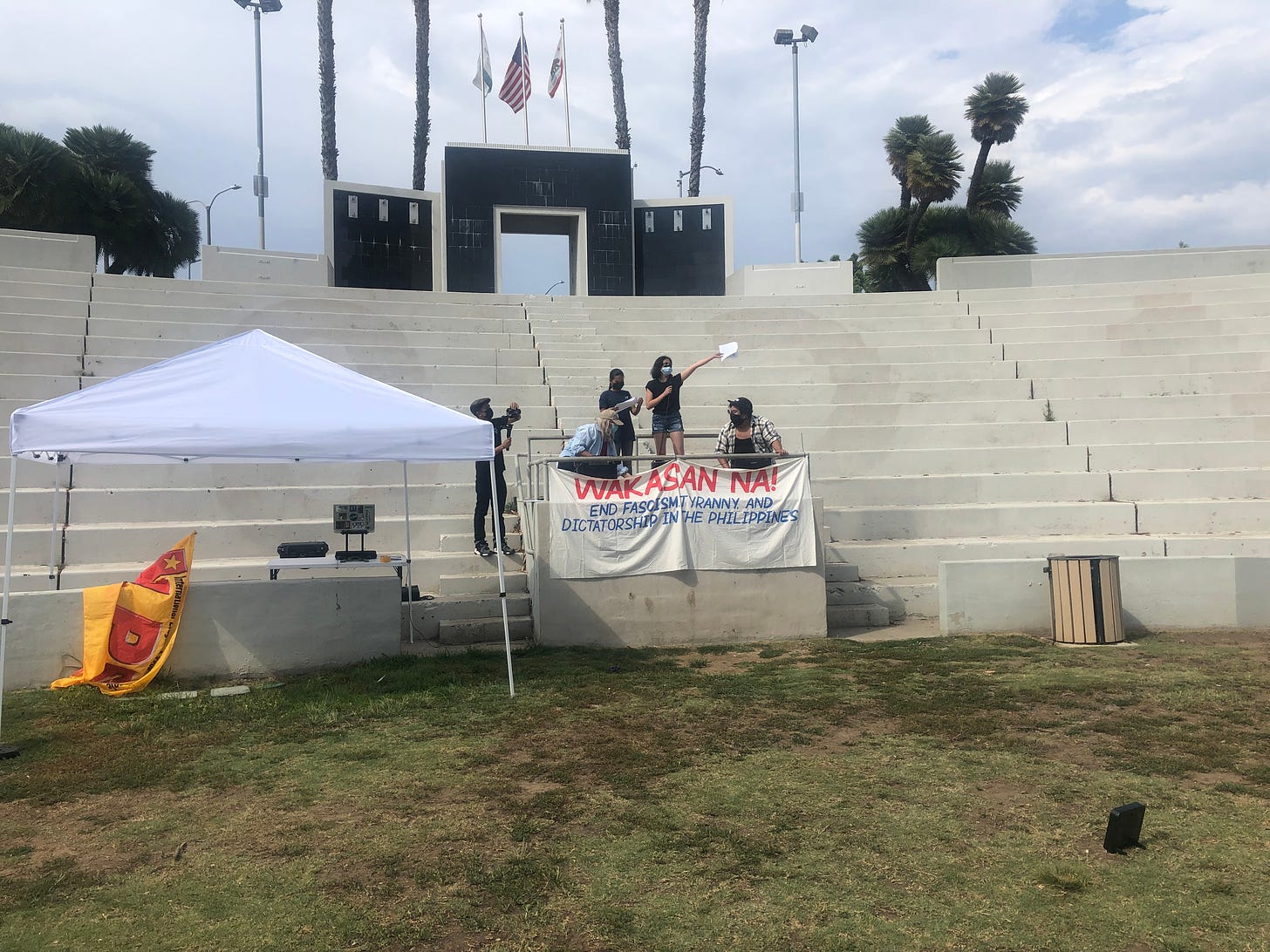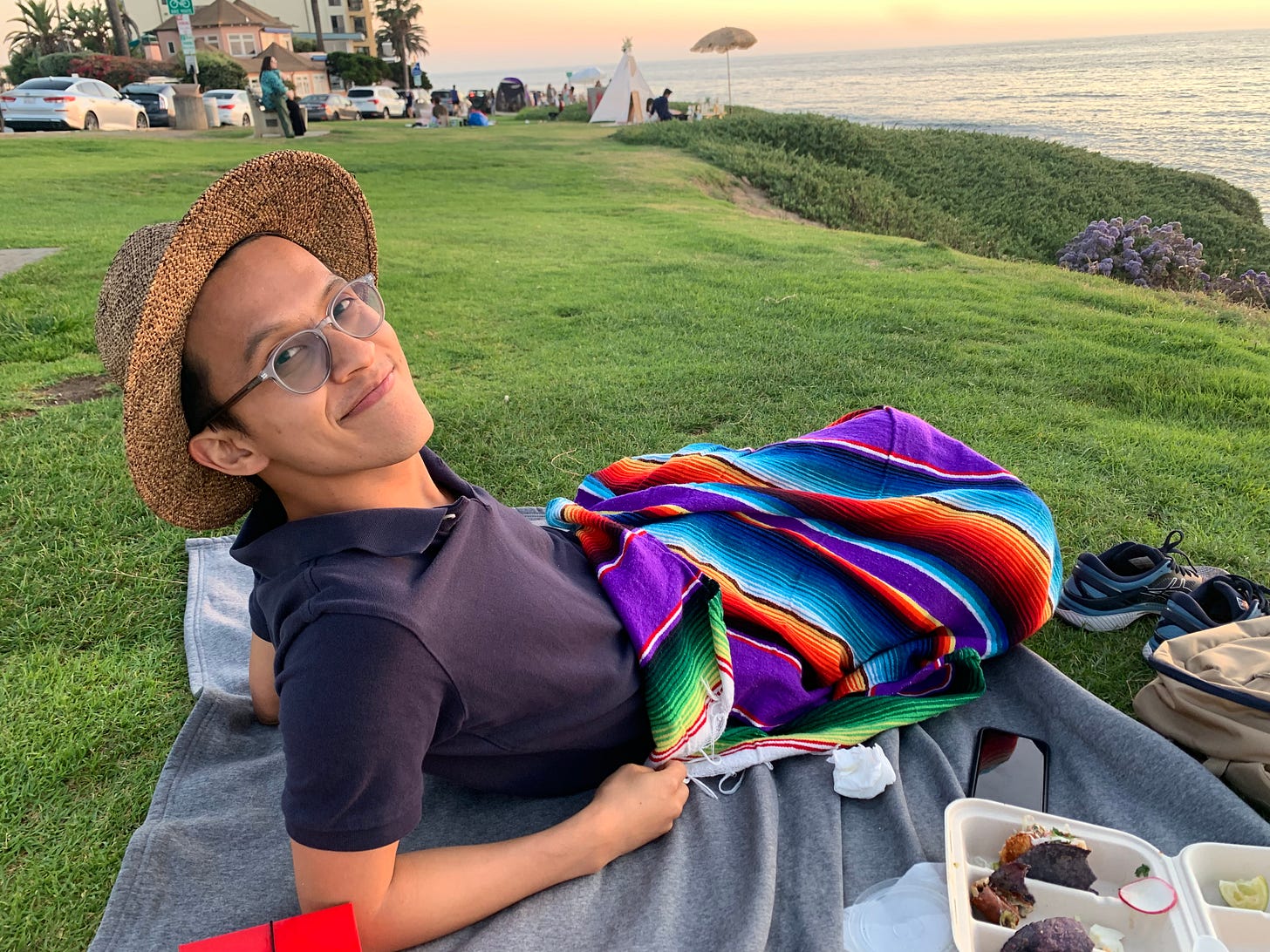J’ai déménagé! (I moved!)
Bonjour, hola, 안녕하세요, kamusta, hello! Since Pride Weekend (aka, last week of June-ish), I have officially become a San Diego resident and it still feels bizarre to say that.
This move has made me think a lot about moving, change, and what it means to be in transition. In Français, the verb move is déménager, which provides a necessary nuance for talking about the varying degrees of forcefulness that accompany the changing process we call moving. When people ask me how my move went, my gut response is to say my first weekend in San Diego was like being warped in a days-long-vertigo as if I were spinning around in a 4D Universal Studios attraction, post-ear-irrigation. But how does this compare to other forms of moving?
Let’s break déménager down. Dé- is a prefix meaning not or separate from (used to create antonyms) and the antonym for déménager is the French verb ménager. And here we find nuance in ménager, which can be roughly translated to the English to spare or to conserve. Now in the French language, ménager is used in varied ways. From managing household chores to treating someone with respect to the well-known phrase ménage à trois (a family of three), it connotes the idea of home and handling with care and attention. Therefore, its antithesis déménager carries the connotative baggage of the separation from home, care, respect, and attention.
Transplanting into a different soil
Moving has become a part of my everyday life. Throughout my childhood and up until high school, I lived with my dad and we lived in 5 different houses (excluding the many apartments I used to spend many weekends and a few holidays in when I’d visit my mom). On average, that would mean I moved roughly every 3 years or so. Since graduating from high school (approximately within a 10-year span), I also moved to a different place 9 different times. Upon reflection, it seems as if a sort of nomadic habit has been ingrained in me. And this experience has forced me to come to terms with the fact that home was and will likely never be a physical place for me. But these moves are different from my move to San Diego.
Take, for example, the pot of China Asters that ironically sits on my balcony. When my new housemate first arrived, it was one of the few things he brought into our new space. I think a lot about the forced migratory journey the plant must have been through, from the plant’s uprooting from its East Asian origins to the transnational commute it took into the US, to its wilting attempt to survive in a light blue pot I recently transferred it into.
It also reminds me of the high school student I tutor once a week. Late last year, their family immigrated to the US seeking refuge, a new safe place to call home and plant their roots. For the sake of privacy, I’ll spare the details here. But their story makes me think about the conditions of displacement and dislocation that forced my parents, grandparents, and great-grandparents to come to the US.
This past week, I was on a video call with Filipino organizers in San Diego to plan and discuss strategy for our upcoming lobbying visits with the offices of two House representatives, Rep Sara Jacobs (D-CA 53) and Rep Juan Vargas (D-CA 51). For some context, these Filipino organizers are hoping for these two representatives to support the Philippine Human Rights Act. The reasons they are focused on lobbying these two representatives are not only because they both sit on the congressional foreign affairs caucus, but also Rep Sara Jacobs represents a large portion of inland San Diego including Asian-dominant Mira Mesa (sometimes nicknamed Manila Mesa) and Rep Juan Vargas represents National City, a neighborhood in the south of San Diego that is filled with a large Filipino population (about 1/5 of the National City population) amongst other large communities of color. During this call, I pointed out that our lobbying messaging lacked the answer to the question, why are we doing this? In response, the call facilitator had us go around and share stories about why passing this act is important to us.
Many people made concrete connections to friends and family back in the Philippines. I, myself, was not so sure. Because I don’t really have firm relationships with anyone in the Philippines, I spoke about the migration stories of my grandmothers and the tough journeys they took to come to the US. I remember one grandmother who spoke about fleeing from the troubling political climate under Ferdinand Marcos only to be stripped to undergarments and examined by immigration officers as if she were a bacteria under a microscope. This same political backdrop led my other grandmother to label the Philippines as a corrupt place where she never wants to live again. This broke my heart. I wondered if my movements and transitions felt anything like their experiences of being driven out of a place you once belonged. Probably not.
Like my childhood homes, like my housemate’s pot of flowers, and like the migration stories of my student and relatives, I still draw a connection because I feel as if I’ve been plucked and uprooted from the Bay Area soil I’ve known and loved dearly into the warmer climate that hugs the Southern tip of California. But I know the difference. I volunteered myself for this transition. Of course, it doesn’t obscure the disruptiveness that accompanies such a move. Instinctively, many people in my life seem to know this and that this transitory experience is one that many people go through, one that crosses differences, a feeling that reminds me of kapwa.
This is why I make the nuance between my “move” accompanied by care and the experience of déménagement. Despite the differences in transitory disruption and disorientation, we relate through those differences. But recognizing these differences by not conflating our “moves” allows me to consider the emotional and material challenges that one faces when being forced to move across the Pacific Ocean. This is not a moral case for care and compassion either. This perspective critiques the scapegoating of migrants around the world:
Rather than a scapegoat for all our problems (unemployment, wealth disparity, racial conflict, etc.), I see migrants (and more broadly, the movement of people) loosely as an effect on one hand, of conflict for power, and on the other hand, of aspiration that bloomed from the circulation of business, ideas, images, and technology around the world. If one is to agree with this line of thinking, one might also deduce that the US is thus walking along a tightrope between an odd contradiction: (1) a firmly set capitalist nation expanding its reach across the globe (perhaps, profit-making in the name of democracy and human rights?) and (2) its delimitations we call national borders that keep people out (maybe, safety and security in the name of exclusive power?).
Returning back from my critical detour to the purpose of writing this letter, I have been transplanted into what feels like different soil, despite the fact that my former city and new city both reside within the same boundaries that US American civilization had created to constitute what we now know as California. Nevertheless, I have been lucky to have had family and friends who have taken care to keep me steady through this disorienting time and to help me navigate my emotions as well as this unfamiliar town.
So in a weird way, I suppose this San Diegan update is really a long-winded shout-out of gratitude to all those who put the ménager back into the déménagement and who came before me and made sacrifices that would give me this chance of a lifetime. If I have learned anything from these stories and experiences, it is this question: what is success without help and care?
And so, the SoCal chapter begins!
Now that I’ve been living in San Diego for about a month and with the exception of having trouble getting into my apartment, the kitchen garbage disposal breaking down, and being afraid of getting back on the road, I can’t help but be grateful. Beyond having this new opportunity, I’ve discovered solace in some new routines and new social circles. In these new routines and social circles, I have found a sense of calmness; almost like waves softening the sun-layered horizon, blurring the sky’s sedimented cliff-like edges. And thanks to the care and support I’ve received, I am suddenly like a plant with roots starting to form.
Thanks for reading, ‘til next time. :)





